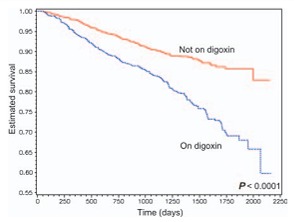Featured
Common Heart Drug Kills 41% More Often than Not Taking It
Whatever possessed medicos to use a known poison as a treatment for heart disease, there can be no possible excuse for the decades of harm and the millions of people who have died as a result of the deadly drug, digitalis.
by Heidi Stevenson

Death and the Maiden, by Catarina Carneiro de Sousa.
For decades, the standard medical treatment for irregular heartbeat has been digitalis, now usually sold under the generic name of digoxin. It’s a killer, and no other term comes close to describing its effects. It kills 41% more people who take it than those who do not. Whether the patient-victims have diagnosed heart disease or not, and whether they’re male or female makes no difference. If you take digitalis, you’re 41% more likely to die.
A study published in the European Heart Journal concludes that, though digitalis does help steady erratic heart beats, it does so at an enormous cost:
Our findings suggest that, in patients with AF, digoxin is associated with increased all-cause mortality after controlling for comorbidities and propensity scores, regardless of gender and the presence or absence of underlying HF. All-cause mortality was 41% higher in patients on digoxin.
There is no hemming or hawing around in that conclusion. If you take digoxin, also known as digitalis, you are 41% more likely to die—and that includes the likelihood of dying from heart disease itself or any other cause.
 If you relate to graphics better, simply look at the graph to the left. This shows the survival rates, in terms of Kaplan-Meier curves of the 4060 subjects in the study.
If you relate to graphics better, simply look at the graph to the left. This shows the survival rates, in terms of Kaplan-Meier curves of the 4060 subjects in the study.
The data comes from the Follow-Up Investigation of Rhythm Management (AFFIRM) trial. The 4060 subjects were followed an average (mean) of 3.5 years. They were seen for follow-ups at the first 2 and 4 month markers, and then every 4 months up to a maximum of 6 years.
Instead of focusing on deaths from heart disease, these authors looked at all-cause mortality. Obviously what matters is not simply whether the drug keeps you from dying of a particular cause, but how it affects your chances of dying from any cause. There’s no benefit in avoiding death from a heart attack if you’re more likely to die from other causes.
The study showed that in patients with atrial fibrillation, but no diagnosis of heart failure, digitalis was responsible for 37% more deaths.
The authors clearly stated that patients without congestive heart failure and low ejection fraction cannot gain any benefit whatsoever from digitalis. As they point out, this is not new information.
Patients with congestive heart failure or ejection fraction less than 40% do see some benefit in terms of heart disease. Nonetheless, those patients still end up with an overall increase of 41% in death. Whatever benefit they gain is far more than offset by the harm.
Results were the same for men and women.
Digitalis is a poison, originally derived from the common garden and wild flower, foxglove. It kills by causing an irregular heartbeat and low blood pressure, not to mention also causing blurred vision, confusion, depression, disorientation and hallucinations, fainting, seeing halos around objects, headaches, lethargy, appetite loss, hives, weakness and drowsiness, vomiting, nausea, diarrhea, and stomach pain.
Obviously, the medical profession has been killing people by the thousands and millions over the decades they’ve been prescribing digitalis, or its more recent formulation under the name of digoxin. First do no harm is apparently nothing more than a bad joke in modern medicine.
Sources:
- Increased mortality among patients taking digoxin-analysis from the AFFIRM study, European Heart Journal, Matthew G. Whitbeck et al, doi:10.1093/eurheartj/ehs348
- Foxglove poisoning (Medline Plus)
Tagged atrial fibrillation digitalis, atrial fibrillation digoxin, congestive heart failure digitalis, congestive heart failure digoxin, conventional medicine, digitalis death, digitalis mortality, digitalis poison, digoxin, digoxin death, digoxin poison, ejection fraction digitalis, ejection fraction digoxin, european heart journal, foxglove digitalis, foxglove poison, heart disease digitalis, heart disease digoxin, modern medicine, pharmaceutical drugs, pharmaceuticals
















Pingback: Common Heart Drug Kills 41% More Often than Not Taking It | Health Impact News